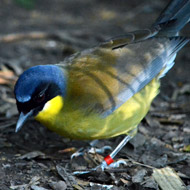
Current spending on threatened birds could be four times more effective
New research has revealed that targeting conservation efforts to safeguard biodiversity could make current spending on threatened birds four times more effective.
The study, by Imperial College London and the Zoological Society of London (ZSL), is the first to link the costs of protecting threatened species with their genetic distinctiveness, measured in millions of years of evolution. It identifies the top 20 birds for safeguarding maximum biodiversity with minimum spend.
Top of the list is the Botha's Lark, a small brown bird that is only found in a restricted part of South Africa, and currently receives no conservation spending at all. The researchers say that it gains top place because it would require little investment to protect it, making it a very cost-effective species to target.
Second on the list is the tooth-billed pigeon - a large pigeon with a hooked bill, found only in Samoa. The researchers say that the bird gains second place because it is both evolutionary distinct and the costs required to protect it are relatively low, although still three times the current spend.
Dr Samuel Turvey of ZSL stresses that this isn't about stopping work on more high profile species, but it is about highlighting the benefits of better allocation of resources: "Our study looked at overall global spending for each species, and of course, the situation on the ground is much more complex, with conversation targets chosen for many different reasons. However, if we do believe that preserving biodiversity should be part of our conservation goals, then our study shows that current spending is fundamentally at odds with what we want to achieve."
The study, The Price of Conserving Avian Phylogenetic Diversity: A Global Prioritisation Approach, is published in Philosophical Transactions of the Royal Society B.
Image (C) Angela. N



 The latest
The latest